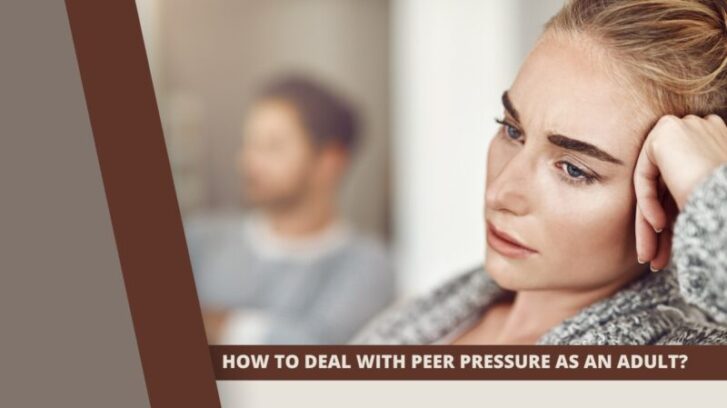Peer pressure is not just a phenomenon confined to the teenage years. It continues to exert its influence well into adulthood, albeit in different forms. As adults, we often find ourselves in situations where we feel pressured to conform to the expectations and choices of those around us. Understanding the nature of peer pressure in adulthood is crucial for maintaining our autonomy and making decisions that align with our true selves.
Define peer pressure and its significance in adulthood
Peer pressure can be defined as the influence exerted by a group or individuals within that group to conform to their values, beliefs, or behaviors. While it is commonly associated with adolescence, it remains relevant in adulthood due to our inherent need for social acceptance and belonging. As adults, we encounter peer pressure in various contexts, such as the workplace, social gatherings, and even within our personal relationships.
Adult peer pressure can manifest itself in numerous scenarios. At work, colleagues may pressure us to work longer hours, take on additional responsibilities, or conform to a particular work culture. In social settings, we may encounter pressure to engage in certain behaviors, such as excessive drinking or spending beyond our means. Even within our personal relationships, friends and family may try to influence our life choices, such as career paths, relationships, or lifestyle decisions.
The influence of peer pressure on adults can have significant psychological and emotional effects. It is crucial to recognize and understand these effects in order to effectively navigate and resist its influence.
Explore the psychological and emotional effects
It can lead to feelings of self-doubt, insecurity, and a loss of personal identity. It can create anxiety and stress as we grapple with the pressure to conform to societal or group expectations. The fear of judgment and rejection can be particularly challenging to overcome, affecting our mental well-being and overall quality of life.
Giving in to peer pressure can have negative consequences, both in the short term and long term. It may result in compromising our personal values and goals, leading to dissatisfaction and regret. Moreover, succumbing to peer pressure can contribute to a lack of authenticity in our relationships and hinder personal growth and self-discovery.
To effectively deal with adult peer pressure, developing self-awareness and assertiveness is essential. These skills empower us to maintain personal boundaries, make independent decisions, and resist external influences.
Self-awareness involves understanding our values, beliefs, strengths, and weaknesses. By cultivating self-awareness, we gain a clearer understanding of who we are and what matters to us. This self-knowledge acts as a compass, guiding us in making decisions that align with our authentic selves and resisting the pressure to conform.
Provide strategies for developing assertiveness skills to maintain personal boundaries
Assertiveness is the ability to express our thoughts, feelings, and needs in a respectful and confident manner. It allows us to set and maintain personal boundaries without feeling guilty or anxious. Practicing assertiveness involves learning effective communication techniques, such as using “I” statements, active listening, and expressing our opinions and preferences assertively but non-confrontationally.
Setting clear boundaries and learning to say no are essential skills in dealing with adult peer pressure. They empower us to protect our personal values and well-being.
Setting boundaries involves defining what is acceptable and respectful behavior from others. It helps create healthy relationships built on mutual respect and understanding. By setting clear boundaries, we communicate our limits and expectations, reducing the likelihood of being subjected to unwanted peer pressure.
Tips and techniques for saying no
Saying no can be challenging, especially when faced with pressure from others. However, learning to say no assertively is crucial for maintaining personal autonomy and resisting unwanted influence. Some techniques for saying no effectively include using “I” statements, expressing gratitude but firmly declining, proposing alternatives, and practicing self-compassion to overcome any guilt or discomfort that may arise.
Building a supportive network of friends and acquaintances can greatly aid in dealing with adult peer pressure. Surrounding ourselves with like-minded individuals who share our values and aspirations provides a strong support system.
Encourage the building of a supportive network of friends and acquaintances
Seeking out individuals who share our values and interests can provide a sense of belonging and validation. By surrounding ourselves with supportive friends and acquaintances, we create a network that understands and respects our choices, making it easier to resist negative peer pressure.
Discuss the benefits of surrounding oneself with like-minded individuals
Being part of a community of like-minded individuals fosters personal growth, encourages self-expression, and promotes a sense of acceptance. Such networks provide inspiration, motivation, and understanding, reinforcing our own values and beliefs.
Developing self-confidence and self-esteem is essential for resisting peer pressure and making independent decisions that align with our authentic selves.
Boosting self-confidence and self-esteem
Building self-confidence involves recognizing and appreciating our strengths, celebrating our achievements, and embracing self-compassion. Engaging in activities that challenge us, setting achievable goals, and practicing positive self-talk are effective techniques for boosting self-confidence. Similarly, nurturing self-esteem involves cultivating self-acceptance, acknowledging our worth, and prioritizing self-care.
Discuss the role of self-worth
Having a strong sense of self-worth is vital in making decisions that align with our authentic selves. When we believe in our own values and worthiness, we are less likely to seek external validation or compromise our values to please others. Self-worth empowers us to prioritize our needs and make choices that are true to who we are.
Identifying negative influences in our lives and developing strategies to challenge and manage them is crucial in resisting peer pressure.
Negative influences can come from various sources, such as toxic relationships, social media, or societal expectations. Encouraging readers to reflect on the people and factors that exert negative pressure on their lives helps them gain awareness and take steps toward addressing those influences.
Provide strategies for challenging and managing those influences
Challenging negative influences requires assertiveness, self-confidence, and the ability to critically evaluate the impact of those influences. Strategies such as limiting exposure to negative environments, engaging in open-minded discussions, and seeking alternative perspectives can help in managing and mitigating the effects of negative influences.
Encouraging readers to embrace their unique qualities, values, and beliefs is crucial in resisting peer pressure and finding fulfillment in life.
Each individual possesses unique qualities and values that make them who they are. By embracing and celebrating these qualities, readers can cultivate a sense of self-appreciation and learn to value their own uniqueness. This self-acceptance acts as a powerful shield against external pressure to conform.
Highlight the benefits of being true to oneself despite peer pressure
Resisting peer pressure and staying true to oneself can be challenging but immensely rewarding. By remaining authentic, individuals foster genuine connections, discover their true passions and interests, and find a sense of purpose and fulfillment.
Practicing mindfulness and self-reflection plays a crucial role in making conscious choices and evaluating the impact of peer pressure on our lives.
Discuss the role of mindfulness in making conscious choices
Mindfulness involves being fully present at the moment and non-judgmentally observing our thoughts and emotions. By cultivating mindfulness, readers can develop the awareness necessary to recognize external influences and make conscious choices that align with their values and goals.
Provide techniques for self-reflection to evaluate the impact
Self-reflection allows individuals to evaluate their experiences, decisions, and the influence of peer pressure on their lives. Techniques such as journaling, meditation, and seeking feedback from trusted individuals can facilitate self-reflection and provide valuable insights into the impact of peer pressure.
In some cases, seeking professional help in dealing with peer pressure can be beneficial. Therapy, counseling, or coaching services provide a supportive and non-judgmental space for individuals struggling with the effects of peer pressure.
Discuss the potential benefits of seeking professional help
Professional support offers individuals an opportunity to explore their experiences, emotions, and challenges related to peer pressure in a safe and confidential environment. Therapists, counselors, or coaches can provide guidance, tools, and strategies tailored to individual needs, helping individuals develop effective coping mechanisms and navigate peer pressure more successfully.
Provide information on therapy, counseling, or coaching services for individuals struggling with peer pressure
Readers can explore various resources, such as licensed therapists, psychologists, or life coaches who specialize in areas such as self-esteem, assertiveness training, or stress management. Online directories, helplines, or recommendations from trusted sources can assist in finding appropriate professional support.
Building resilience and healthy coping mechanisms are essential in withstanding peer pressure and managing the stress and anxiety associated with it.
Explore strategies for building resilience to withstand peer pressure
Resilience is the ability to bounce back from challenges and setbacks. Developing resilience involves cultivating optimism, practicing self-care, building a support network, and reframing negative experiences as opportunities for growth. These strategies enable individuals to withstand the pressures of peer influence and maintain their own course.
Discuss healthy coping mechanisms to manage stress and anxiety related to peer pressure
Healthy coping mechanisms play a vital role in managing the stress and anxiety that peer pressure can trigger. Techniques such as exercise, mindfulness meditation, deep breathing exercises, engaging in hobbies, and seeking emotional support from loved ones can help individuals navigate the emotional challenges associated with peer pressure.
Reflecting on past experiences and learning from mistakes allows individuals to grow, adapt, and make more informed decisions in the face of peer pressure.
Encourage reflection on past experiences and lessons learned
Reflecting on past experiences helps individuals identify patterns, understand the impact of peer pressure, and learn valuable lessons. It provides an opportunity for growth and personal development, enabling individuals to make more informed choices in the future.
Every experience, including those influenced by peer pressure, has the potential to contribute to personal growth and self-improvement. By embracing these experiences as opportunities for learning and growth, individuals can become more resilient, self-aware, and better equipped to navigate future challenges.
Setting realistic expectations and goals for oneself is crucial in resisting external pressure and making choices that align with personal values and aspirations.
Setting realistic expectations involves recognizing one’s limitations, values, and priorities. By setting achievable expectations, individuals can avoid succumbing to external pressure and focus on personal growth and well-being.
Provide guidance on setting achievable goals
Setting achievable goals requires individuals to consider their own values, strengths, and desires. By aligning goals with personal aspirations, individuals can resist the influence of peer pressure and work towards what truly matters to them.
Identifying and prioritizing personal values is essential in resisting peer pressure and making decisions that are true to oneself.
Identifying personal values involves reflecting on what truly matters to individuals in different aspects of life, such as relationships, work, and personal growth. By recognizing and prioritizing these values, individuals gain clarity and a sense of direction that guides their decision-making process.
Discuss the benefits of aligning decisions with core values to resist peer pressure
Aligning decisions with core values allows individuals to maintain integrity and authenticity in the face of peer pressure. It fosters a sense of self-fulfillment, promotes self-confidence, and helps individuals build a life that is in harmony with their deepest beliefs and desires.
Encourage acceptance of diverse perspectives and choices
Embracing diversity involves recognizing that every individual has their own unique experiences, beliefs, and values. By promoting acceptance and respecting different perspectives, individuals contribute to a more inclusive and supportive society.
Celebrating individuality promotes self-expression, fosters creativity, and encourages others to embrace their authentic selves. By valuing and supporting individual differences, individuals create an environment where peer pressure loses its power, and everyone feels empowered to make choices that reflect their true selves.
Conclusion
Dealing with peer pressure as an adult requires self-awareness, assertiveness, and the ability to set and maintain personal boundaries. By developing these skills and strategies, individuals can resist unwanted influences, embrace their individuality, and make choices that align with their authentic selves. It is an ongoing journey of self-discovery, growth, and empowerment, but one that ultimately leads to a more fulfilling and authentic life.
Related Posts:
- Understanding Attachment Styles and Their Influence…
- 15 Ways to Change Your Mindset and Attitude -…
- Mastering the Art of Boring Self-Care: Elevate Your…
- How to Speak to Your Employer about Mental Illness:…
- The Early Signs of Mental Illness: Guardian of Your Mind
- How Long Does Magnesium Stay In Your Body? Learn to…

















